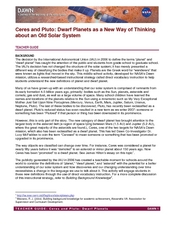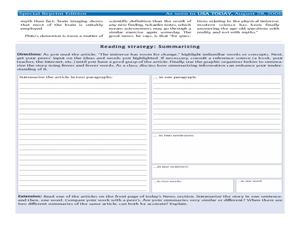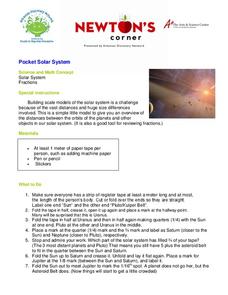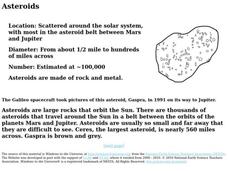Curated OER
Galaxy Adventure
Working in groups, learners create a mnemonic device, give an oral presentation, and create a pictorial representation of the correct sequence of the planets and asteroid belt from the sun. An assessment rubric is included in the lesson.
Scholastic
Study Jams! Our Solar System: Outer Planets
A set of seven slides presents an artist's rendition of our solar system, specifically, the asteroid belt, Kuiper Belt, and our outer planets: Jupiter, Uranus, and Neptune. The slides are beautiful, and a printable set with text is...
Curated OER
Planets on Parade
Review all of the planets in our solar system with this informative PowerPoint. Each planet is listed on its own slide, accompanied by facts and an image. There are three multiple choice question listed at the end of the presentation.
University of Colorado
Are All Asteroids' Surfaces the Same Age?
There are more than 600,000 asteroids in our solar system. Pupils analyze images of two asteroids in order to determine if they are the same age. They count craters for each asteroid and compare numbers.
Curated OER
Asteroids Between Mars and the Sun
In this asteroids of the solar system activity, students observe a diagram showing all the minor planets found in the orbit of Mars. Students answer 4 questions about the minor planets inside the orbit of other planets, they find the...
Glynn County School System
The Outer Planets
Are outer planets just like inner planets? Nope! The outer planets are much more spread apart than the inner planets. An informative PowerPoint presentation shows why this is true as well as facts about the individual planets in the...
University of Colorado
Are All Asteroids' Surfaces the Same Age?
Did you know scientists can tell the age of an asteroid by looking closely at its craters? This final lesson of a six-part series focuses on two asteroids, Gaspra and Ida, in order to demonstrate the concept of dating asteroids. Scholars...
Simply Worksheets
Solar System - Missing Words
In this space science worksheet, students complete nine sentence fill-in's about the planets in the solar system. There is no word bank.
University of Colorado
Clay Planets
Why do scientists use models? In the first installment of 22, groups create scale models of our solar system. They then share and discuss their models.
Glynn County School System
Solar System Formation and Extra-Solar Planets
Has the solar system always been like it is today? A lesson presentation begins with a discussion of the formation of our solar system. It continues with a compare and contrast of the inner and outer planets.
Curated OER
Other Objects in the Solar System
For this solar system worksheet, students complete a crossword puzzle given 11 clues about objects in the sky such as asteroids, meteoroids, comets and planets.
Curated OER
Ceres and Pluto: Dwarf Planets as a New Way of Thinking about an Old Solar System
Young scholars examine the new categories of planets and how planets were reclassified. In this solar system lesson plan students complete activities using Venn diagrams and images of planets.
Curated OER
Planets in a Row
Learners use Internet to research and take notes about each planet for a fact book. They then illustrate each page in the fact book and check their facts with a solar system key. When finished, they display their work and share new facts...
Curated OER
Voyage of Discovery
Students develop a sense of the scale of our solar system by creating a one to ten billion scale model. They calculate the relative sizes and distances for the planets and asteroid belt using a guiding worksheet. To create the model they...
Curated OER
What's "In" There: A Study of the Inner Planets - Mercury, Venus, Earth, and Mars
First graders identify and explore the four inner planets. In this planet science activity, 1st graders watch a PowerPoint about the planets. Students read the book Our Solar System and discuss the inner planets. Students create a book...
Journey Through the Universe
Our Solar System
Take your class on a journey through our solar system. Learners explore each planet, from Mercury to Pluto, and discuss various features that differentiate one from another. They complete activities related to the topics and discuss the...
Center for Math and Science Education
Pocket Solar System
How in the world can something as big as the solar system possibly fit in your pocket? Complete this simple modeling activity and find out, as young scientists gain an appreciation for the incredible scale of outer space.
Center for Math and Science Education
Solar System Launch
Trying to understand the vastness of outer space can be quite a challenge for young scientists. Help put things in perspective with this cross-curricular activity as students work in pairs creating scaled models of...
Curated OER
Space Science: Journey Through the Solar System
Students explore the Solar System and examine the characteristics of al the planets. Through research and discussion, they create catalogs of the Solar System's components. Next, students use their findings to create Powerpoint...
Curated OER
The Universe Has Room for Change
In this universe and change worksheet, students read about the demotion of Pluto as one of the 9 planets as well as other changes in science. Students summarize their reading and identify unfamiliar words in the article....
Curated OER
Pocket Solar System
Motivate your class with this instructional activity. Learners explore the solar system and practice working with fractions using this resource. They construct scale models of our solar system, and use fractions to correctly configure...
Curated OER
Asteroids
In this worksheet on asteroids, students look at a picture asteroids and read accompanying facts, along with a brief paragraph.
Curated OER
What's "Out" There?
First graders investigate the five outer planets. In this space science lesson, 1st graders read the book Our Solar System and identify the five outer planets. Students create a booklet and write about outer planets.
Research Parent
Solar System Cards
Find all things solar system in a set of reference cards. Even Pluto makes an appearance! Each of the 24 cards has a picture and accompanying informational text that gives brief background about the object.

























